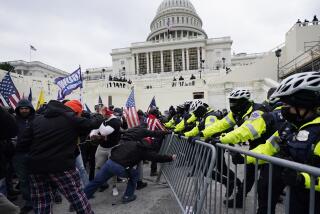Curb Hate Crime, Not Free Speech : High court ruling suggests acts of intolerance are the province of traditional criminal code
- Share via
“Let there be no mistake,” wrote U.S. Supreme Court Justice Antonin Scalia, “ . . . burning a cross in someone’s front yard is reprehensible.” We couldn’t agree more. Burning a cross in someone’s yard also is illegal, a violation of criminal trespassing and vandalism laws. But as utterly repugnant as such behavior is, the Supreme Court was correct Monday in its unanimous decision to strike down a St. Paul, Minn., hate crime ordinance. The ordinance--which banned behavior that specifically “arouses anger, alarm or resentment in others on the basis of race, color, creed, religion or gender”--is an unconstitutional limitation on 1st Amendment guarantees of free speech and expression, the court held.
Two years ago, members of a black family awoke in the pre-dawn hours to see a crudely fashioned cross aflame on their lawn. St. Paul officials charged a white teen-ager with violating state and local laws against bias-motivated conduct. The juvenile challenged the local ordinance as unconstitutionally broad and vague.
The U.S. Supreme Court upheld his claim, declaring that the 1st Amendment prohibits the government from “silencing speech on the basis of its content.” The government cannot punish those who “communicate messages of racial, gender or religious intolerance” simply because their ideas are offensive to most and deeply hurtful to some, it said.
As a practical matter, the court said, the juvenile could have been charged with arson, trespassing or criminal damage to property.
The court’s decision is reminiscent of its 1989 ruling overturning laws prohibiting the burning of an American flag. And like the flag decision, the hate-crimes decision will surely generate more debate, particularly because the number of such crimes continues to rise and because the nine justices, while unanimous in striking down the St. Paul ordinance, differed sharply in their reasoning. Scalia, writing for five justices, rejected the ordinance as a “content-based” restriction on the 1st Amendment; such restrictions are “presumptively invalid,” he wrote. But Justice Byron R. White and three other justices said that St. Paul’s law was unconstitutional because it was not focused narrowly enough on expressions that could prompt violence.
In recent years, 46 states have enacted statutes to address hate crimes, and as many as 100 colleges and universities now have codes prohibiting speech and behavior deemed to be racial, religious or sexual harassment.
Many of these laws, including California’s, are more narrowly drawn than St. Paul’s and some permit enhanced penalties for crimes motivated by bigotry. This may be a wiser approach to curbing intolerable crimes of hatred.
More to Read
Sign up for Essential California
The most important California stories and recommendations in your inbox every morning.
You may occasionally receive promotional content from the Los Angeles Times.









